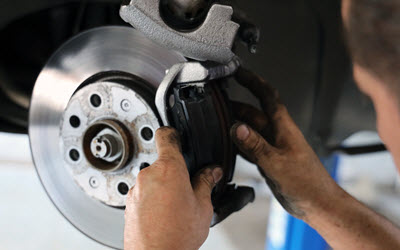The braking system of your Audi plays a critical role in ensuring your safety and that of other road users. It’s essential to keep your brakes in top condition to ensure maximum performance and safety.
Regular servicing of your Audi brakes is essential to ensure that they remain in top condition. The service intervals will depend on the model of your Audi, but it’s generally recommended to have your brakes checked and serviced every 10,000 to 15,000 miles or at least once a year. During a brake service, a technician will inspect the brake pads, rotors, calipers, and brake lines for wear and tear, and replace any damaged or worn-out parts. In this article, we will discuss how to preserve the life of your Audi brakes, including maintenance, warning signs, and when to change brakes.
Prolong Your Audi’s Brakes
- Use high-quality brake pads: The quality of brake pads used on your Audi can significantly affect the life of your brakes. Low-quality brake pads may wear out quickly, cause damage to the rotors, and compromise the performance of the braking system. It’s, therefore, advisable that you use high-quality brake pads that are designed specifically for your Audi model. Original Equipment Manufacturer (OEM) brake pads are recommended because they are designed to fit your Audi’s braking system perfectly and provide optimal performance.
- Avoid aggressive driving: Aggressive driving habits, such as sudden braking, can significantly reduce the life of your Audi brakes. When you apply sudden brakes, you put a lot of stress on the braking system, which can cause premature wear and tear of the brake pads and rotors. Thus, you have to prevent sudden braking by driving defensively and maintaining a safe distance from other vehicles.
- Keep your Audi clean: Keeping your Audi clean can also help preserve the life of your brakes. Brake dust, dirt, and debris can accumulate on the brake pads and rotors, causing them to wear out faster. Regularly cleaning your Audi during maintenance will help to remove any dirt and debris that may accumulate on your brakes, keeping them in top condition.
Warning Signs of Brake Problems
It’s essential to pay attention to warning signs that indicate that your Audi brakes need attention. Here are some warning signs that indicate that your brakes may need attention:
- Squeaking or grinding noise: If you hear a squeaking or grinding noise when you apply brakes, it may be an indication that your brake pads are worn out and need to be replaced. The noise is caused by the metal-to-metal contact between the brake pads and rotors.
- Vibrations when braking: If you feel vibrations in the steering wheel or brake pedal when you apply brakes, it may be an indication of warped rotors. Warped rotors can be caused by excessive heat or worn-out brake pads and can compromise the performance of the braking system.
- Reduced brake responsiveness: If you notice that your brakes are not as responsive as they used to be, it may be an indication of a problem with the brake system. This could be caused by worn-out brake pads, a malfunctioning brake booster, or a problem with the brake fluid.
When to Change Your Audi’s brakes
The lifespan of your Audi brakes will depend on various factors, including your driving habits, the quality of brake pads used, and the frequency of servicing. Typically, brake pads should last between 30,000 to 70,000 miles, depending on the factors mentioned above. However, it’s essential to have your brakes checked regularly to determine when they need to be replaced.
Get Fast and Reliable Repairs at Fast Lane European
If you notice any of the warning signs, then you  have to let a certified Audi technician run a check as soon as possible. At Fast Lane European, we are always on top of the game when it comes to helping our customers fix their vehicles. We serve car owners in and around San Jose, CA. If you need help with your Audis brake, you can reach out to us through our contact or stop by our workshop now!
have to let a certified Audi technician run a check as soon as possible. At Fast Lane European, we are always on top of the game when it comes to helping our customers fix their vehicles. We serve car owners in and around San Jose, CA. If you need help with your Audis brake, you can reach out to us through our contact or stop by our workshop now!
 Mon – Fri: 8:30 AM – 5:30 PM
Mon – Fri: 8:30 AM – 5:30 PM 3585 Stevens Creek Blvd, San Jose, CA 95117
3585 Stevens Creek Blvd, San Jose, CA 95117 (408) 985-2000
(408) 985-2000 (408) 985-1000
(408) 985-1000





 Make An Appointment
Make An Appointment